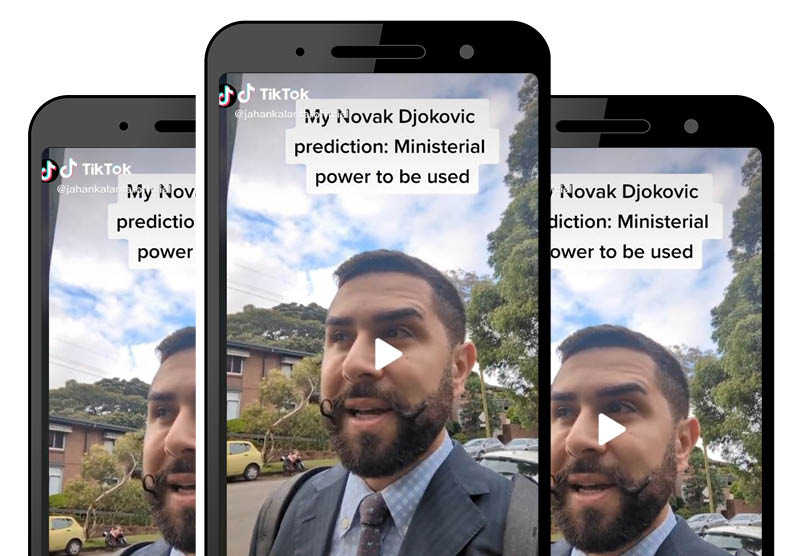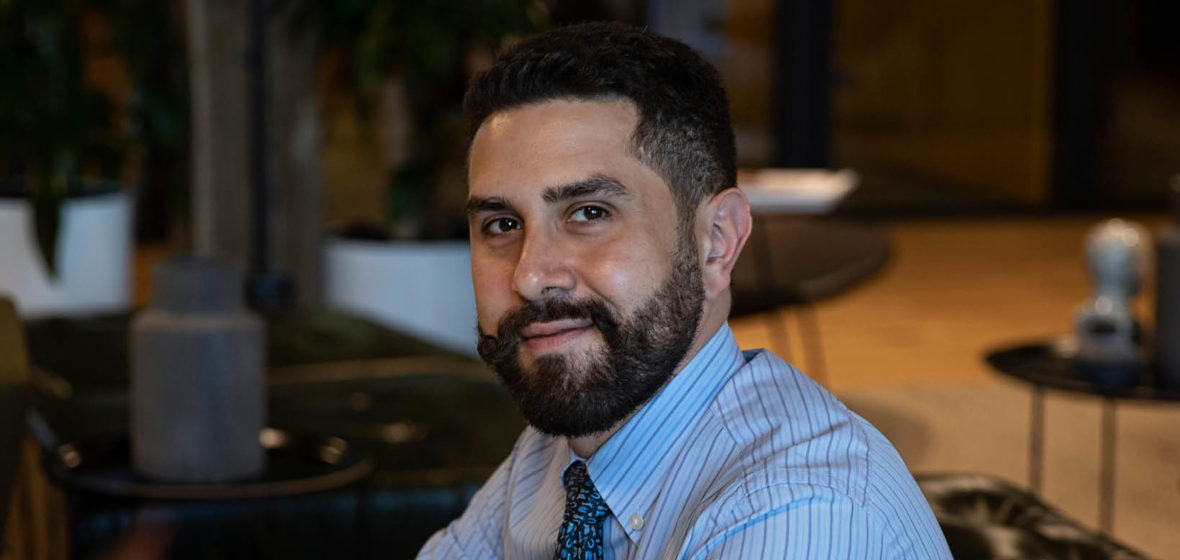Lawyer Jahan Kalantar started creating social media videos as a way to stave off boredom during lockdown. Now more than 81,000 virtual friends are glued to his content.
A perfectly waxed moustache is always going to make an impression. For Jahan Kalantar, a Sydney-based criminal lawyer and Managing Partner at Executive Law Group, the curled locks have become just as important as the tailored three-piece suits that define his professional appearance.
“I think I saw someone once who had one and I stole the idea,” he admits. “If someone wants to talk to me, they now have a reason. It’s a ready excuse to have something to chat about. I find it really disarms people, but it’s also very polarising. You’d be surprised at the amount of people who have a say.”
But we’re not here to discuss his iconic look. We’re here to talk about evidence. More specifically, what it means if you’re caught on camera damaging police property after a grainy video showing a white sedan ramming a NSW Police vehicle to push it out of the way in an underground carpark went viral.
“If the light is flashing on a police car, that means it’s in active usage,” he explains in a clip shared to popular social media app TikTok. “The best thing you can do in those circumstances is to see if you can locate the officers and [ask] them to move. The worst thing you can do is drive into them and then drive off and record it on social media as evidence of you doing the wrong thing.”
At the time of writing, this piece of social media advice has been viewed more than 123,000 times and Kalantar’s channel amassed more than 1.5 million likes. Kalantar says the appetite for easily digestible legal explainers is enormous – in fact, he’s carved out a niche for himself answering questions that are too complicated to ask Google, but that you don’t need a law degree to understand. It’s a hobby he started during the first lockdown in 2020, unleashing his creativity as a way to unwind and combat the depression of being isolated.
“It’s hit and miss,” he says of his content. “I did a video I thought about for maybe 10 seconds that did quite well. It was a short clip explaining that if you want to get out of paying child support, you shouldn’t have children, because if you have children you should pay for them. Other things I plan for weeks and they might only get 500 views. But I think the algorithm favours consistency, because it’s growing.”

What is TikTok?
- TikTok is a video-focused social media app that launched in 2016 and has exploded in popularity over the past two years.
- It attracted attention through the pandemic as locked-down users turned to the platform to create short-form videos, often featuring choreographed dances.
- Other videos show tips, stunts and jokes between 15 seconds to 3 minutes long.
- The app has been downloaded more than 3 billion times and was the most popular app in 2020.
Kalantar’s audience is young, primarily between the ages of 16 and 25, and about 65 per cent of his followers are men. It’s likely because of the content he talks about, lending his experience in criminal law to discuss issues such as drinking, drugs, and police matters. Many of his videos respond to questions he receives. For example, does throwing someone into a pool constitute assault? Do I really need to show private medical information, in the form of my vaccination status, at a cafe? Can I secretly record someone and use that evidence in court? What happens if I get caught with “the party stuff”?
“It makes sense that this kind of content might connect with them, because it’s relevant to their life story,” he says. “It’s funny, it was actually one of the associates at the firm who told me I was designed for TikTok. I thought it was a fad – I thought it was too old for it! But once you get into it, and it starts to understand you, it’s really good at feeding you the kinds of custom content that you really enjoy.”
Other video advices respond to viral videos – like a clip of a drunk driver reaching for the firearm of the female police officer who was arresting him – as well as news content. Recently, he’s discussed everything from tennis player Novak Djokovic’s deportation from Australia, to former premier Gladys Berejiklian’s involvement in ICAC proceedings, to the decision to strip Prince Andrew of his military titles.
“It’s a great creative outlet,” he says. “It’s also made me better at explaining abstract concepts. As lawyers, we say we explain things in plain English, but then we send documents with 15 pages of interpretation. It can be nonsensical to people outside the profession. With this, they show up, they ask questions, they’re engaged. It’s two-way, the audience has a say in the art you’re creating.”
Kalantar’s experience has been overwhelmingly positive. However, he still has to deal with the trolling that permeates almost every aspect of life online. The worst part has been the racial commentary (he has Persian heritage) which can be very hurtful, but he feels it’s important to keep showing up.
“It’s a torrent,” he says. “There are trolls, there are bigots, there are people who are there in bad faith. Every day you get 10 or 20 comments that are trying to hurt you, which is a weird thing. It doesn’t stop. As a 34-year-old lawyer, I can deal with that. But I do hold concerns, especially for young people.”
Naturally, the best way to beat them is to keep on keeping on, and Kalantar has no shortage of ideas. On top of TikTok, he’s a keen writer and podcaster, and has even spoken at a TEDx event in Sydney.
“I’m obsessed with the law,” he says. “It’s an amazing thing, it gives us a social framework and it’s such a sophisticated alternative to combat. I find it exciting and I love talking about it.”




